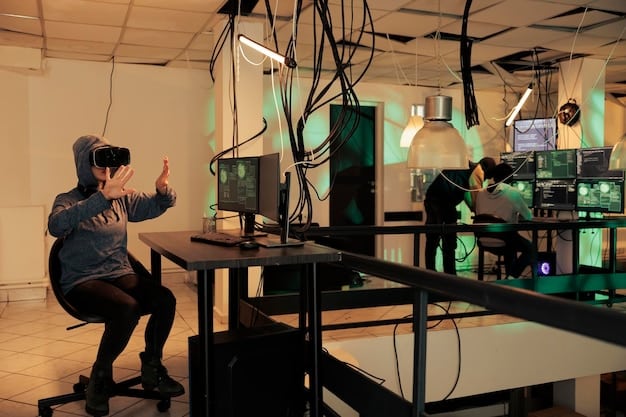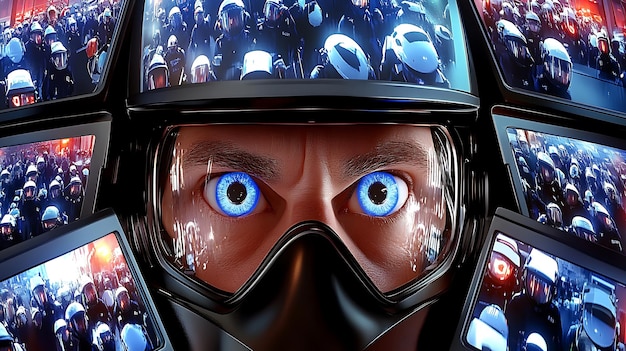AI in US Game Development: Consequences & Future Trends

The increasing use of artificial intelligence (AI) in game development in the US brings potential consequences, including job displacement for some roles, the enhancement of game quality and immersive experiences, and ethical considerations regarding AI-generated content.
The rise of
What are the Potential Consequences of the Increasing Use of Artificial Intelligence in Game Development in the US? AI is transforming how games are made, played, and experienced, and it’s critical to understand the wide-ranging impacts.
The Evolution of AI in Game Development
AI has transitioned from a futuristic concept to a practical tool, revolutionizing various stages of game development. Understanding this evolution is key to grasping its potential consequences.
Early Applications of AI
Initially, AI was primarily used for basic tasks such as creating non-player character (NPC) behaviors and pathfinding. These early applications were rule-based and relatively simple.
Modern AI Capabilities
Today, AI can handle complex tasks like generating realistic environments, creating dynamic storylines, and even assisting in game design. Machine learning algorithms enable AI to adapt and improve over time.
Here are some key applications of AI in modern game development:
Generating procedural content
Creating adaptive AI opponents
Enhancing player experiences through personalized gameplay
Analyzing player data to optimize game design
By understanding these developments, developers can leverage AI to its full potential while mitigating potential negative consequences.
Potential Job Displacement in the Industry
One of the most pressing concerns is the potential for AI to displace human workers in the game development industry. As AI tools become more sophisticated, they can automate tasks that were previously performed by artists, designers, and programmers.
Automation of Repetitive Tasks
AI can automate many repetitive tasks, such as level design and asset creation, potentially reducing the need for human labor in these areas.
Impact on Specific Roles
Certain roles, such as junior artists and quality assurance testers, may be particularly vulnerable to displacement as AI becomes more adept at performing their tasks.
However, AI is not expected to completely replace human workers; instead it’s projected to displace roles. These roles are particularly in positions which can easily replaced with automated actions:
Junior Artists
Data Entry Personnel
Quality Assurance Testers
While AI presents challenges, it also creates opportunities for workers to adapt and learn new skills.
Enhancement of Game Quality and Immersive Experiences
Despite concerns about job displacement, AI has the potential to greatly enhance the quality and immersive experiences of video games.
Procedural Content Generation
AI can generate vast and detailed game environments with minimal human input, leading to richer and more varied gameplay experiences.
Adaptive AI and Personalized Gameplay
AI can analyze player behavior and adjust the game’s difficulty and content accordingly, creating a personalized experience for each player.

The enhancement of game quality through AI translates to:
More realistic and immersive game worlds
More challenging and engaging gameplay
Adaptability that caters to each player
AI-driven enhancements promise to revolutionize the way games are designed and enjoyed.
Ethical Considerations and AI-Generated Content
The increasing use of AI in game development raises several ethical considerations, particularly regarding the potential for AI-generated content to infringe on copyright or promote harmful stereotypes.
Copyright and Ownership
Determining the ownership of AI-generated content can be complex, as it may be unclear who—or what—should be credited for its creation.
Bias and Representation
AI algorithms can perpetuate and amplify existing biases if they are trained on biased data, leading to games that reinforce harmful stereotypes.
Questions of accountability can emerge. Consider these questions regarding content generation:
Who is responsible if an AI generates content that is offensive or harmful?
Can AI-generated content be truly original, or is it simply a derivative of the data it was trained on?
How can developers ensure that AI is used ethically and responsibly?
Addressing these concerns is crucial for ensuring that AI is used in a way that benefits both developers and players.
Impact on Game Design and Creativity
AI has the potential to both enhance and challenge human creativity in game design. While it can handle mundane tasks, it may also limit the scope for originality and innovation.
AI as a Creative Tool
AI can assist game designers by generating ideas, prototyping levels, and providing feedback on gameplay mechanics.
Balancing AI and Human Input
Finding the right balance between AI-generated content and human creativity is essential for preserving the artistic integrity of games.
Ways that humans can still stay involved:
Use AI as a tool to augment their creative abilities, rather than relying on it to make all decisions.
Focus on developing unique and innovative gameplay mechanics that AI cannot replicate.
Collaborate with AI to create games that are both engaging and artistically fulfilling.
By embracing AI as a creative partner, developers can unlock new possibilities while retaining their unique artistic vision.

The Future of Game Development with AI
The future of game development is likely to be shaped by increasing integration of AI, with both challenges and opportunities on the horizon.
Emerging Technologies
New AI technologies, such as generative adversarial networks (GANs) and reinforcement learning, are poised to further transform the industry.
Adapting to Change
Game developers will need to adapt to these changes by learning new skills, embracing new tools, and finding new ways to collaborate with AI.
Some predictions for the future of AI in game development include:
More sophisticated AI opponents that can learn and adapt to player strategies.
More realistic and immersive game worlds that blur the line between reality and simulation.
More personalized and adaptive gameplay experiences that cater to each player’s unique preferences.
By staying informed and adapting to change, game developers can leverage AI to create groundbreaking games that push the boundaries of what’s possible.
The Role of Education and Training
To mitigate the negative consequences of AI in game development, it is crucial to invest in education and training programs that equip workers with the skills they need to succeed in the changing industry.
Upskilling and Reskilling Initiatives
Providing opportunities for workers to learn new skills, such as AI programming, data analysis, and game design, can help them transition to new roles.
Collaboration Between Industry and Academia
Collaborations between industry and academia can ensure that training programs are relevant to the needs of the industry and provide workers with the skills they need to succeed.
Some examples of education and training programs that could help workers adapt to the changing industry include:
Online courses and bootcamps that teach AI programming and data analysis.
Apprenticeships and internships that provide hands-on experience in game development.
Degree programs in game design and development that incorporate AI into the curriculum.
By investing in education and training, the game development industry can ensure that its workforce is prepared for the challenges and opportunities of the AI era.
Key Point
Brief Description
🤖 Job Displacement
Automation may lead to some job losses, especially in repetitive tasks.
🎮 Enhanced Quality
AI can create more immersive and personalized gaming experiences.
⚠️ Ethical Issues
Concerns about copyright, bias, and responsible AI usage need addressing.
📚 Education Imperative
Upskilling and training are crucial for developers to adapt to AI.
What are the key AI trends in US game development?
What types of roles are most at risk due to AI in US game development?
How can AI improve the quality of games in the US market?
What are some ethical concerns related to AI-generated content in games?
How can US game developers adapt to the increasing use of AI?
Conclusion
In conclusion, the increasing use of AI in game development in the US brings both opportunities and challenges. While it has the potential to enhance game quality and create immersive experiences, it also raises concerns about job displacement and ethical considerations. By investing in education and training, embracing collaboration between industry and academia, and addressing ethical concerns proactively, the game development industry can harness the power of AI while mitigating its potential negative consequences.
Industry News